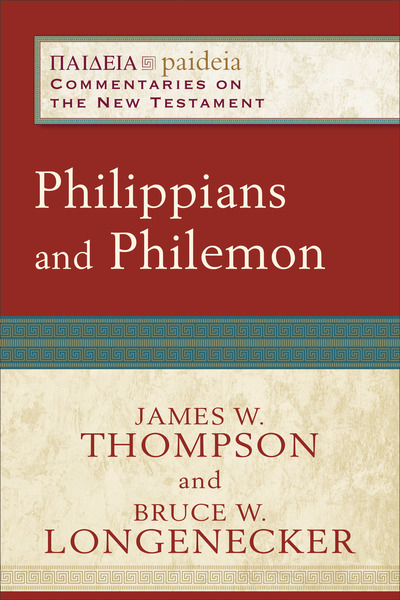
Tap on a feature to learn more.
Available for:
iPad, iPhone, Android, Mac, and Windows.
Two respected senior New Testament scholars examine cultural context and theological meaning in Philippians and Philemon in this addition to the well-received Paideia series. Paideia commentaries explore how New Testament texts form Christian readers by:
Students, pastors, and other readers will appreciate the historical, literary, and theological insight offered in this practical commentary.
Editorial Board
Paul J. Achtemeier (emeritus, Union Theological Seminary in Virginia), Loveday Alexander (University of Sheffield), C. Clifton Black (Princeton Theological Seminary), Susan R. Garrett (Louisville Presbyterian Theological Seminary), Francis J. Moloney, SDB (Salesian Province of Australia)
"Out of all the commentaries I've read and reviewed recently, I definitely like Thompson (on Philippians) and Longenecker (on Philemon)...This is written in a very readable style, concise, good on Greco-Roman context, and judicious in its exegesis...Sensible discussions and very helpful charts and tables. This is worth having!" — Michael F. Bird, Euangelion blog (Patheos)
"Both authors fulfill the series aim of rooting the letters in their ancient setting (social, cultural, rhetorical) while focusing on the primary text for contemporary readers. Nevertheless, they engage with other NT scholars. I found discussions clear, engaging, and thought-provoking...Another valuable addition to the series." — Robert S. Dutch, Journal for the Study of the New Testament
"The Paideia series is directed to seminarians and to theology and university students looking for solid biblical study. These quality commentaries offer detailed information on the background, content, and literary form of the New Testament texts but do so in a nontechnical manner. In this volume two veteran scholars provide rich commentary on two of Paul's most beautiful and enticing letters." — Donald Senior, CP, The Bible Today
"James Thompson and Bruce Longenecker have added another useful volume to the student-oriented Paideia series...Both commentators make critical issues accessible, including showing why they matter. They will help students understand these letters and move them toward becoming critical readers...This book is a valuable resource for students and pastors who want accessible, solid biblical scholarship with helpful suggestions about its theological value today." — Jerry L. Sumney, Interpretation
"[The authors] are well-qualified, seasoned NT scholars. Both have done significant work in Pauline studies and in NT rhetoric...A number of maps, charts, pictures, and textboxes throughout the commentary aid the readers' learning experience. This volume is a worthy addition to the Paideia commentary series...Both commentators are strong in offering and engaging alternative options and for keeping the reader in the flow and argument of the text. Scholars, seminary students, and teachers, both in the academic classroom and those in teaching roles in churches, will find this commentary valuable for staying focused on the intent of the text and making reasonable applications today." — Stanley N. Helton, Restoration Quarterly
James W. Thompson (PhD, Vanderbilt University) is scholar in residence at the Graduate School of Theology at Abilene Christian University in Abilene, Texas. He is the editor of Restoration Quarterly and the author of numerous books, including Moral Formation according to Paul, Pastoral Ministry according to Paul, The Church according to Paul, and Hebrews in the Paideia commentary series.
Bruce W. Longenecker (PhD, University of Durham) is professor of religion and W. W. Melton Chair of Religion at Baylor University in Waco, Texas. He previously taught at the University of St. Andrews, the University of Cambridge, and Durham University. He is the author or coauthor of numerous books, including Thinking through Paul: A Survey of His Life, Letters, and Theology; The Cross before Constantine: The Early Life of a Christian Symbol; Philippians and Philemon in the Paideia commentary series; and the bestselling The Lost Letters of Pergamum.